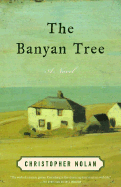Paul Bowles 1949 book, The Sheltering Sky, focuses on the lives of an American couple and a friend and their travels together in the North African desert. Bowles never answers the question as to why they choose to travel that region, although he hints at marital difficulties between Kit Moresby and her husband, Porter, who it seems, is just seeking adventure and believes Europe to be ruined by war.
Kit is portrayed as rather manipulative; She becomes guilt-ridden after almost responding to the romantic attentions of their friend, Tunner. Her relationship with Porter is noticeably lacking in both romance and genuine affection. Tunner apparently has amorous feelings for Kit, which are never fully explored or explained by the author.
Another hallmark of these characters is that none of them seem aware of the myriad dangers present around them---from disease and bad food to political unrest. There is also the matter of an over-bearing, extremely racist, anti-Semitic English woman and her thieving son, who attempt to befriend the trio. Aside from feeling superior to Jews, the French and Africans, which the reader learns about via increasingly jarring commentary, her character and that of her son, appear to exemplify the worst of English classicism and racism, while Americans are portrayed as ignorant, adventure-seeking fools. Arabs are seen in a somewhat more sympathetic light.
When Porter dies after an unnamed illness, Kit wastes no time in fleeing, leaving Porter's corpse to be discovered by Tunner and the police. Leaving her old life behind, Kit determines to have an adventure of her own, paying no heed to the possible dangers, cultural differences or vagaries of politics that darken the road ahead.
Eventually becoming the concubine of an Arab, Kit also realises she too is ill, a situation that escalates as the last part of the story unfolds. When she is escapes and is at last located by the police and consulate, the woman sent to organise Kit's return to the United States is genuinely shocked at her appearance and attitude and wonders whether Kit has gone mad.
The reader, at least this one, is left with that unanswered question as well as others. and struck by Bowles apparent dislike of his characters.
As an expatriate himself for over fifty years, Bowles may have seen adventurers of every stripe; he is certainly unstinting in his portrayals. An interesting contrast in his own life is that Paul Bowles writing is characterized by dark elements while his musical compositions, for which he is also well known, are of much lighter tone. For more information about the author, visit the official Bowles website at http://www.PaulBowles.org.
The Sheltering Sky is a provacative read.
Subscribe to:
Post Comments (Atom)












Hey E, thanks for the commentary. I was waiting for someone to be the first.
ReplyDeleteWell, my understanding of the book suggests that Port and Kit both feel that everything is changed by the war, Europe definitely, but Africa also.
All the major characters I think were manipulative to a certain degree, but what I felt most was their respective profoundly self-centered and selfish behaviors. Kit is so fearful, she's practically frozen with paranoia. Port seems indecisive, so much so that the decisions he does makes inevitably turn out for the worst. Tunner is somewhat shallow, out for his own pleasure.
I felt that Kit's ultimate (mis)adventures are just a continuation of her time on the train with Tunner--attempting to run from something she's trying to avoid only to find herself in a dangerous situation where she's also forced to witness the darker side of life. Her initial infidelity is just a prelude to her later sexual encounters. Her weak character leads her to become the sexual plaything of many men.
Porter's bout with typhoid I though was an interesting way to depict his unwillingness to face reality. he chose to put both himself and his wife in greater peril instead of reuniting with his friend whom he had asked to them in Africa in the first place. Kit's inability to cope with his illness and subsequent death was just a manifestation of her weak character, her fear and egocentric view of the world. I believe she has gone mad, perhaps PTSD, as her last disappearance seems to suggest.
Tunner I felt was not really well fleshed out. But I thought it somewhat telling that he felt Port to be his only best friend after he had died, a man who ultimately ran away from the opportunity of reunion even in the face of not getting his passport back.
The two Brits, I still don't know if they're truly mother and son or cougar and paramour, were interesting counterpoints to the three Americans. Their antisemitism, racism, et al., I think were possibly written close representation, not about Brits, but about narrow-minded and close-minded people.
As a whole, all the characters irritated me somewhat--never sharing their respective thoughts but wanting so desperately to be understood, making decisions based on personal gain, regardless of how it could affect others in the party. I just wanted to slap them. And I wouldn't have put up with the Lyles even for a comfortable car ride.
Anyway, just my thoughts. Anyone else?
Thanks Jo, for taking the time to share your comments. I hope others will do the same. As I have already finished Hideous Kinky, I'll see if anyone wants to post on that.
ReplyDeleteInteresting from both of you. I found it a surprising book...I've got lots to say- but I have to dash to work now. I will be back in about 12 hours!
ReplyDeleteback again...
ReplyDeleteThanks for starting us off here e. You write a very good review. Thanks for the link too- sounds like the character of Port was somewhat autobiographical.
I was surprised by The Sheltering Sky. It did not start off as a promising read- did I really want to read about the disintegration of a marriage in a Saharan theatre- with its unforgiving sun, scrubby grey landscape (mostly), foul smells, fouler diseaes, cockroaches, bedbugs? No, I was with Kit on this one- they should have gone to Italy! Like the hapless consulate official at the end, who buys her clothes in Paris, I was on the ouside- uncomprehending.
Then I started to get sucked into the story and as the pace quickened I found myself drawn to that Saharan landscape as if, like a black hole, it had its own gravitational pull. No-one goes into that landscape untouched, unaffected. Even Tunner is changed from a flippant flirt into someone who is able to acknowledge truths about himself. I agree with both e and Jo that Tunner's character was not developed. At the end of the day, poor chap, he was an irrelevance.
I was interested in the desciption of typhoid fever. I carry out immunisations with typhoid vaccine as part of my job, but I have never met someone who had it! I first I assumed that typhoid vaccine was not available at that time- but then Bowles tells us explicitily that Port had refused to have any vaccines- why? was he on some death-wish mission? If only Kit had taken him back towards 'civilisation' instead of travelling deeper into the desert-maybe he could have been treated- it is treatable with antibiotics. I suppode she was scared by the meningitis scare.
Kit and Port's relationship is very sad. They seem so suited in many ways; seem to know each other so well; seem to be so interdependent. They own each other in marriage- it is if they are conjoined. Yet neither is satisfied and as e says Kit feels little real love or affection for Port- I thought her abandonment of him as a dying man quite gross. Maybe she was scared, I don't know. Definitely weak as Jo has said.
They both pay the price for dabbling in an environment which fascinates them but to which they cannot belong until it claimes each of them in different ways. There was a nice contrast between the ease with which the camel-train drivers lived in that landscape, and the struggles of the westerners trying to explore it. Kit's sexual adventures with her new Arab 'husband' were interesting- she was envigorated by great sex she was having, but her lust even then was not satiated.
The themes of ownership and journeying were strongest for me. The awful Lyles (yes, Jo, I think cougar and paramour) behaved in the worst of colonial ways, thinking they owned Africa. Kit and Port owned each other. The Camel-drivers owned slaves and owned the women in their harems. We may feel we have ownership of the planet, but ultimately Kit and Port become enslaved at the mercy of their environment. You realise slavery exists in many forms- and many women today are enslaved in various societies.
The sense of journeying is strong- the characters are always moving on, leaving places behind. At the end, after her escape, you know that Kit's journey has not ended. She can never go back; she cannot slip back easily into NY society; she is forever changed; her journey continues. The reader is not left with any confidence that her life will be changed for the better though!
ps- e- I havn't finished Hideous Kinky yet :)
ReplyDeleteCinnamon,
ReplyDeleteYou make some interesting points regarding journeying and what I call enslavement; one can be enslaved mentally, physically, emotionally or be a slave to perceptions or ideas. I don't know if Kit was weak or simply manipulative and secretive about her own feelings. She may not even have understood her own feelings or ideas clearly until things were beyond her control...
Interesting discussion.
Cool- a bookworm! I can imagine you have a library at your home - my hubby's dream! Fascinating thoughts here... I guess if I want to skim through a book, I'll check your blog first. You might have a summary. :)
ReplyDeleteKeep reading and writing! :)
Hi Lancelonie!
ReplyDeleteWhat, in your opinion, is the point of the parable that Smail relates to Port?
ReplyDelete